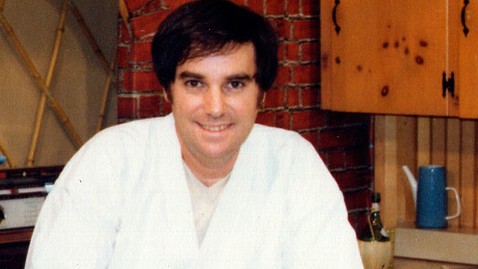Ginsu Knife Pitch Co-Creator, Barry Becher, Dies

(Image Credit: PriMedia/AP Photo)
When Ed Valenti went to meet Barry Becher for the first time, he drove to the meeting in his 1972 orange Datsun 240Z. When he arrived at his destination, he parked his car next to another 1972 Datsun 240Z, also in orange.
"And I got out of the car and I said, 'Well, this guy obviously has class,'" Valenti recalled.
That other car was Becher's. From then on, the two became fast friends and business partners, and developed an enormously successful marketing business that changed the way products were sold on television.
Even though they went on to sell numerous products, their most identifiable pitch is probably the infomercial for the Ginsu knife, featuring the iconic, unforgettable phrase, "But wait, there's more."
Becher had been suffering from kidney cancer and died June 22 at a Florida hospital of complications from surgery. He was 71.
In an interview Thursday with ABCNews.com, Valenti reflected on the legacy he and Becher had created.
"We wanted to sell products and we were having a great time. We didn't realize at that time we were changing history," he said.
Becher had owned AAMCO transmission franchises in Rhode Island, and Valenti was an account executive for an NBC station in that area.
Their first infomercial - for the Miracle Painter - delivered far beyond their expectations, especially because the big advertising firms on Madison Avenue had all passed on the pair's concept. So they produced it themselves.
"And we put a man painting the ceiling in a tuxedo. Can you think of a better way to explain no-drip?" Valenti asked.
They sold 1 million Miracle Painters at $10 each.
In the course of a decade, the men said they amassed more than $500 million in sales. Another product - Armourcote - was their most profitable, but Ginsu remains the most widely known.
Millions were sold from the commercial's debut in 1978 into the early 1980s, with audiences mesmerized by images of an exotic-sounding knife that seemed able to cut through anything. The infomercial promised a 50-year guarantee and "much, much more."
Sam Craig, a marketing professor at New York University's Stern School of Business, said Ginsu stands apart from most other infomercial products because it was popular for so long and it had common sales methods that are used to this day.
"They're taking these things that were done at state fairs and carnivals where it could be demonstrated to a group of maybe 10, now you could demonstrate the same thing to a million people or more at the same time," Craig said. "And it takes something that's relatively mundane and makes it appear dramatic."
The impact of their sales style on popular culture has been significant. The Ginsu knife commercial has been spoofed on "Saturday Night Live" and comedians, including Jerry Seinfeld and Gallagher, have all had fun with the concept.
"Every joke-teller [is] using, 'But wait , there's more,' 'How much would you pay?' and all the literary classics that we wrote," Valenti said.
"It takes something like this, a tragedy, to make me realize we did as a team accomplish something and made a contribution and really changed the face of direct marketing," he said. "Did we start out knowing that? No. Was there a lot of forethought, that we woke up in the morning and said, 'We're going to change the way people buy things on TV?' We just didn't know. We had an idea. We tried it, it worked … "
Becher was a special kind of businessman, Valenti said.
"He was a guy that truly put himself in other people's shoes, and because of that he was able to be very empathetic, very entrepreneurial and very businesslike, all in the same breath, and that's rare," he said.
Becher and Valenti eventually shifted their business to become mainly a media buying firm, PriMedia, but their legacy was sealed. They helped popularize the use of credit cards and 800-numbers for over-the-TV sales and their work is seen as a precursor to extended 30-minute infomercials and round-the-clock shopping channels, including Home Shopping Network.
Becher retired in 2005, the same year he and Valenti published their book, "The Wisdom of Ginsu."
Click HERE to read an excerpt from "The Wisdom of Ginsu."
Becher was the godfather to Valenti's daughter, Erin. Although he was Jewish, Valenti, who is Catholic, received special dispensation from the church so Becher could baptize his daughter.
He last talked to Becher a few months ago.
"I'm deeply saddened by the fact that I didn't have a chance to say goodbye to my friend and to tell him how much everyone loved him," Valenti said.
Becher's funeral was Monday. His family is considering etching on his tombstone, "But wait, there's more."
The Associated Press contributed to this report.